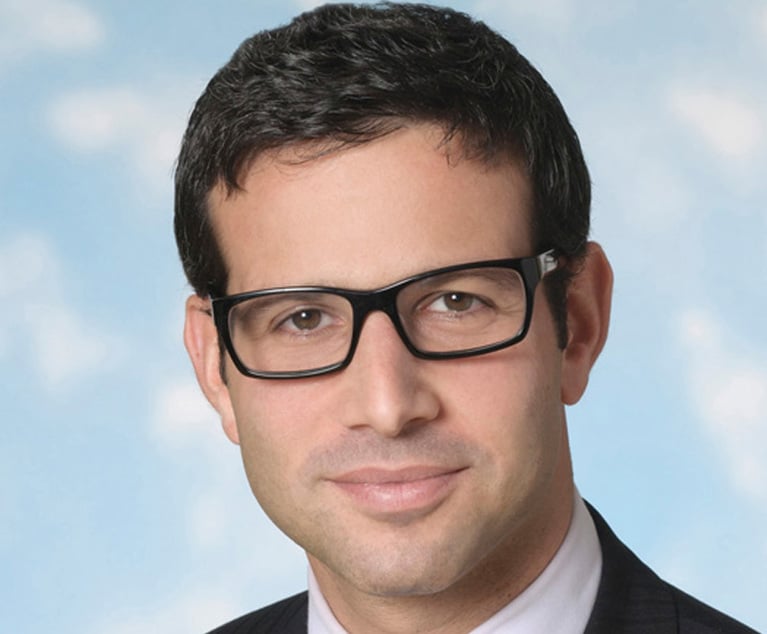 Nicole M. Perry, partner with Jones Day. .
Nicole M. Perry, partner with Jones Day. .On the Rise 2018: Nicole M. Perry
Nicole M. Perry, partner, Jones Day
August 31, 2018 at 06:00 AM
7 minute read
Nicole M. Perry, partner, Jones Day
Experience:
- Jones Day, 2006-present
Education:
- University of Houston Law Center, 2006
- University of Texas at Austin, 2003
What drew you to a career in law?
I have wanted to be an attorney since I was a child. In fact, I wrote “lawyer” on an index card at Career Day in Kindergarten. As my father would say, I have always liked to argue and persuade others to adopt my point of view. While I did not know it at the time, my career decision was later validated when I discovered that lawyers affect change. I have been fortunate to participate in many important legal changes over the course of my career, including advocating for Central American asylum seekers looking for refuge in the United States, counseling clients on policy changes to best combat hackers and prevent or mitigate data breaches, and assisting an air ambulance company battle preempted state laws across the country.
Have you set a specific goal that you want to achieve in the next year?
I plan to sit for the Certified Information Privacy Professionals (CIPP) exam in the next year to continue to expand my privacy expertise. Privacy and security are key concerns for many of Jones Day's clients, who must grapple daily with balancing individual privacy interests with information needs and various security and business considerations. CIPP certification provides global training for privacy and data protection and will allow me to help clients around the world bolster compliance and risk mitigation practices.
What has been your proudest career moment and your biggest hurdle?
My proudest career moment was cross examining one of the two plaintiffs in a Fair Credit Reporting Act case in Arkansas Federal court in 2014. After careful planning and close study of the key admissions the plaintiff had provided during her deposition, I was able to get the plaintiff to admit that her real complaint was against another party that had settled out of the case rather than our client. My colleagues later referred to the admission as a “Perry Mason” moment that may very well have won the case for our client.
My biggest hurdle was surviving a grueling trial in Oakland, California, in a case that resulted in the biggest copyright verdict in history at the time in 2010. Trial preparation and the trial itself required great physical and mental stamina and a positive attitude. Fortunately, we had a terrific trial team and ultimately achieved a fantastic result for our client.
Where do you fit on a 1-10 work-life balance scale with 10 being nirvana? Please explain.
My work-life balance is pretty close to perfect, at a 9. I have been able to have a rewarding career while remaining happily married to my husband (who was my neighbor and first boyfriend at eleven years old) and raising three beautiful little girls ranging in age from six years to two months. I believe your life partner is the single most important key to favorable work-life balance, and I am happy to say that I won the lottery with my husband, who greatly values and encourages my career and often carries more than his share on the workload at home.
What is the top quality that you've used to succeed in the profession?
Persistence is the key to being a successful lawyer. As a trial lawyer in the tech space, I have witnessed continually evolving technology—from autonomous vehicles to complex software platforms to smart meters. You have to be willing to learn and adapt as things change and try again if you do not initially obtain the outcome you are seeking. Persistence is also important in the pro bono world, when the facts and political environment may not always on your side. I have always been stubbornly persistent in everything that I do, starting in elementary school when I was able to beat my opponents on the tennis court even when they were more skilled than me.
Who is your favorite mentor and why?
My father, Vance St. Jean, has always been my greatest mentor. In keeping with my top legal quality of persistence, he taught me at an early age to never give up—a lesson he learned in college from a professor that had a great influence on his life. My father has been an industrial salesman in the oil and gas space for more than 35 years, but he has long wished to be a lawyer. As a result, he is keenly interested in my practice and has often been a sounding board for me when I am dealing with thorny issues. He has also taught me to be confident in everything that I do. He is supportive and inspirational, teaching me various adages that are critical to succeeding in the legal world. One such adage that is famous among my trial teams is “the last 10% is the most important.”
What's the best advice anyone has ever given you?
Never give up in your career or personal life.
What trends are you observing in the profession that you're excited about?
I am particularly excited about the current emphasis on cybersecurity among our clients and in the legal profession generally. Cyber incidents present a unique scenario where the crime victim becomes the target of civil suits, regulatory investigations, and reputational concerns, and I enjoy assisting clients with prevention, mitigation, investigation, and litigation following an incident. I am also excited to assist our clients in revamping their data protection policies as the European Union's General Data Protection Regulation (GDPR) becomes the global standard. In fact, California just adopted a “GDPR-like” privacy law last week that will require many companies to overhaul the way they interact with consumers and manage personal data. These new regulations present a host of legal challenges for our clients, and the scope of enforcement actions remains unclear.
I am also excited to follow the adoption of Blockchain technology and the legal challenges that arise as a result of its usage, including ownership of intellectual property and smart contract technology.
What is the greatest challenge you see for the legal profession?
Cybersecurity also happens to be the greatest challenge for the legal profession. Adequate security over client files and other sensitive data is an increasingly important concern for law firms, who are becoming prime targets for hackers. Firms store valuable confidential information that can be effortlessly monetized, including trade secrets, prospective patent information, bank and personal information, and merger and acquisition data that can be used for insider trading. Ensuring all of this data is protected is a key task for law firms. The number of threats and the growing sophistication of attacks represents a daunting challenge, and law firms need to mitigate these risks to avoid reputational concerns and legal claims.
This content has been archived. It is available through our partners, LexisNexis® and Bloomberg Law.
To view this content, please continue to their sites.
Not a Lexis Subscriber?
Subscribe Now
Not a Bloomberg Law Subscriber?
Subscribe Now
NOT FOR REPRINT
© 2025 ALM Global, LLC, All Rights Reserved. Request academic re-use from www.copyright.com. All other uses, submit a request to [email protected]. For more information visit Asset & Logo Licensing.
You Might Like
View All
Kirkland's Daniel Lavon-Krein: Staying Ahead of Private Equity Consolidation

Vinson & Elkins: Traditional Energy Practice Meets Energy Transition
4 minute read
Advising 'Capital-Intensive Spaces' Fuels Corporate Practice Growth For Haynes and Boone
4 minute read
Get to Know Texas Lawyer's Attorney of the Year Finalists
Trending Stories
Who Got The Work
Michael G. Bongiorno, Andrew Scott Dulberg and Elizabeth E. Driscoll from Wilmer Cutler Pickering Hale and Dorr have stepped in to represent Symbotic Inc., an A.I.-enabled technology platform that focuses on increasing supply chain efficiency, and other defendants in a pending shareholder derivative lawsuit. The case, filed Oct. 2 in Massachusetts District Court by the Brown Law Firm on behalf of Stephen Austen, accuses certain officers and directors of misleading investors in regard to Symbotic's potential for margin growth by failing to disclose that the company was not equipped to timely deploy its systems or manage expenses through project delays. The case, assigned to U.S. District Judge Nathaniel M. Gorton, is 1:24-cv-12522, Austen v. Cohen et al.
Who Got The Work
Edmund Polubinski and Marie Killmond of Davis Polk & Wardwell have entered appearances for data platform software development company MongoDB and other defendants in a pending shareholder derivative lawsuit. The action, filed Oct. 7 in New York Southern District Court by the Brown Law Firm, accuses the company's directors and/or officers of falsely expressing confidence in the company’s restructuring of its sales incentive plan and downplaying the severity of decreases in its upfront commitments. The case is 1:24-cv-07594, Roy v. Ittycheria et al.
Who Got The Work
Amy O. Bruchs and Kurt F. Ellison of Michael Best & Friedrich have entered appearances for Epic Systems Corp. in a pending employment discrimination lawsuit. The suit was filed Sept. 7 in Wisconsin Western District Court by Levine Eisberner LLC and Siri & Glimstad on behalf of a project manager who claims that he was wrongfully terminated after applying for a religious exemption to the defendant's COVID-19 vaccine mandate. The case, assigned to U.S. Magistrate Judge Anita Marie Boor, is 3:24-cv-00630, Secker, Nathan v. Epic Systems Corporation.
Who Got The Work
David X. Sullivan, Thomas J. Finn and Gregory A. Hall from McCarter & English have entered appearances for Sunrun Installation Services in a pending civil rights lawsuit. The complaint was filed Sept. 4 in Connecticut District Court by attorney Robert M. Berke on behalf of former employee George Edward Steins, who was arrested and charged with employing an unregistered home improvement salesperson. The complaint alleges that had Sunrun informed the Connecticut Department of Consumer Protection that the plaintiff's employment had ended in 2017 and that he no longer held Sunrun's home improvement contractor license, he would not have been hit with charges, which were dismissed in May 2024. The case, assigned to U.S. District Judge Jeffrey A. Meyer, is 3:24-cv-01423, Steins v. Sunrun, Inc. et al.
Who Got The Work
Greenberg Traurig shareholder Joshua L. Raskin has entered an appearance for boohoo.com UK Ltd. in a pending patent infringement lawsuit. The suit, filed Sept. 3 in Texas Eastern District Court by Rozier Hardt McDonough on behalf of Alto Dynamics, asserts five patents related to an online shopping platform. The case, assigned to U.S. District Judge Rodney Gilstrap, is 2:24-cv-00719, Alto Dynamics, LLC v. boohoo.com UK Limited.
Featured Firms
Law Offices of Gary Martin Hays & Associates, P.C.
(470) 294-1674
Law Offices of Mark E. Salomone
(857) 444-6468
Smith & Hassler
(713) 739-1250






